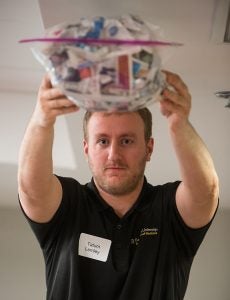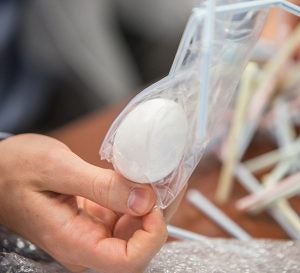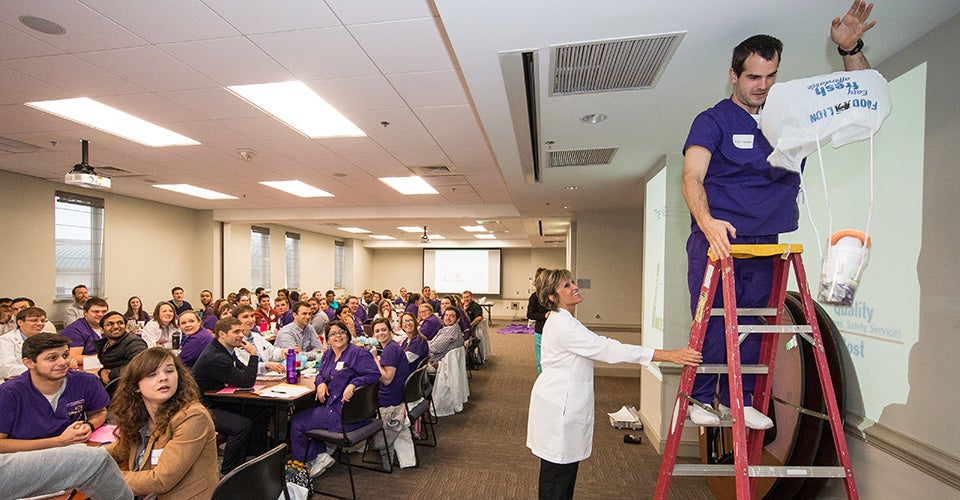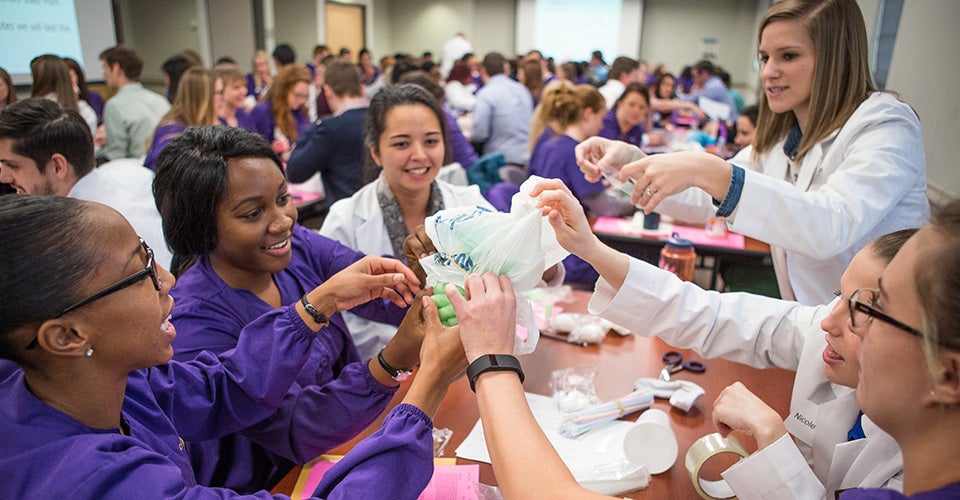RAISING VALUE
Students practice improving quality of care in egg drop activity
This was not your typical elementary school egg drop.
Instead of basic physics, quality improvement was the name of the game for students in the College of Nursing and the Brody School of Medicine during a collaborative leadership activity earlier this semester at East Carolina University.
Eggs stood in for patients as 186 medical and nursing students worked together in small teams to come up with the best way to care for their charges through multiple drops using a limited budget of supplies like plastic wrap, straws and newspaper.

Medical student Tatum Lemley prepares to drop his team’s egg.
Essentially, the team who dropped their egg without breaking it, while employing the least expensive packaging, achieved the highest value care, explained Dr. Luan Lawson, assistant dean for curriculum, assessment and clinical academic affairs at Brody.
“Collaborating and communicating effectively with physicians and other personnel are essential in providing high-quality health care,” said Gina Woody, clinical associate professor in the College of Nursing.
For the first drop, teams could use an unlimited amount of packing supplies to protect their egg. If their egg survived the drop, their next step was to lower the cost of care by using fewer supplies while still protecting the egg. If their egg cracked or broke, teams had to provide more care while still monitoring costs.
“Students immediately transfer this new knowledge to a common clinical challenge facing health providers on a daily basis,” Lawson said. “Using both the fun experiential teaching methods and the immediate transfer to a clinical scenario allows students to link this knowledge to the importance of using interprofessional teams to improve healthcare.”
The activity was part of the Quality Improvement Olympics, funded by Brody’s REACH (Redesigning Education to Accelerate Change in Healthcare) grant from the American Medical Association.
The QI Olympics is designed to bring students together to learn foundational principles of patient safety and quality improvement, according to Lawson.

Students had a limited budget of supplies like plastic bags and straws to protect their egg, which helped them learn how to provide the best care at the lowest cost.
“We feel that implementing these educational interventions early in the educational continuum allows students to improve communication and teamwork skills better,” she said. “This prepares future professionals to lead health care teams of the future and improve the health of our patients.”
In between each drop, students learned how make plans and measure outcomes, skills that are key to quality improvement.
“It was very challenging,” said Trey Hasty, a third semester nursing student. “It was a good way to represent the health care system. We try to get patients the best care at the least cost. Working as part of an interprofessional team really made me realize the importance of teamwork.”
When second-year medical student Elizabeth Ferruzzi participated in this activity last year, she thought it was odd at first but has found the experience helpful.

Nursing student Kyle Travios drops his team’s egg as nursing professor Gina Woody looks on.
“It’s absolutely worth it,” she said. “What you learn here comes in handy later in clinical settings. I don’t think a lot of schools have done something like this. Brody wants well-rounded students. It was incredible to work with nursing students and start collaborating early in our first year.”
Ferruzzi said she was excited to come back and share with first-year students how much impact the activity has had on her education.
“The health care system is changing rapidly,” she told the students. “Incorporating more quality improvement is very important and leads to better outcomes for patients. ECU is at the forefront of adding this to the curriculum.”
